Education is a growing field, and technology plays a vital role in enhancing the way students learn. Of the many advancements, one breakthrough stands out: artificial intelligence or AI. AI tools in education are transforming the way students learn and how educators teach, personalizing lessons, automating mundane administrative tasks, and fostering innovative solutions for skills development. This article delves into what AI tools for education are, the benefits they offer, and why they are also gaining importance in modern classrooms.
What Are AI Tools for Education?
AI educational tools are programs or platforms that emphasize improvement in teaching and learning processes. AI tools automate mundane, repetitive tasks like grading and even scheduling, allowing the educator to focus on teaching. Such tools also enable personalization in learning because they adapt the information according to the needs and progression of students.
For educators, the AI tools for education assist in finding knowledge by providing insights through data analysis, thereby fine-tuning teaching strategies. For the students, these tools offer features like virtual tutoring, adaptive quizzes, and instant feedback, which make learning more fascinating and effective—especially when it comes to finding the best AI tools for homework that provide real-time assistance. Many platforms also integrate with the best language learning apps, helping students practice language skills alongside academic subjects.
Types of AI Tools for Education
- LMS: AI-powered Learning Management Systems, including Moodle or Canvas. Features include smart algorithms suggesting learning resources while tracking the progression of students.
- Tutoring and Assessment Tools: AI tutors such as ScribeSense, and platforms such as Quizlet. Machine learning algorithms that can give the ability to deliver personal and individualized assessments and feedback.
- Speech recognition tools: Speech recognition tools are used to support students with disabilities or language learners by providing AI technology to analyze their speech and improve upon it.
- Collaboration platforms: AI enhances tools such as Google Classroom by workflow refinement, content suggestion, and communication enhancement between the teacher and students.
Benefits of Using AI in Education
AI has various benefits for both teachers and learners. Some of the most significant advantages of AI in education include the following:
1. Personalized Learning
AI tools offer students tailored learning since it is possible to analyze the data on students and provide lessons that will be appropriate for individual needs. For instance, online-based self-study tools such as DreamBox or Khan Academy use algorithms in AI, which automatically alter the content intensity according to the performance.
2. Automation of Administrative Tasks
AI saves time to the teacher on marking and even in recording attendance besides producing reports. For instance, using Gradescope saves teachers much time spent on grading instead of long hours preparing for lessons and interactions with students.
3. Universal Accessibility
AI tools make accessibility possible by making education a right for every learner. For example, visually and learning impaired students can have access to the learning material because of text-to-speech and speech-to-text technologies such as Kurzweil 3000 or Microsoft Immersive Reader.
4. Instant Feedback
AI-based products provide immediate feedback to the student, and they can easily pinpoint and correct the mistakes. That is how it accelerates the learning curve and helps to cultivate a growth mindset. Moreover, the instructor learns know-how about the performance of the student, and he can easily trace what needs to be improved.
5. Insights into Data
For example, massive amounts of student data that AI technologies read can provide insights for teachers. For example, platforms such as Smart Sparrow provide analytics capabilities for inferring struggling areas of students, so educators can modify curriculum factually based on information deduced.
6. Global and Lifelong Learning
AI enables students of various parts of the world to bridge language gaps and receive more interactive distance education. With AI-based translators and the succeeding language learning system, it has now become easy to access resources or learn a new skill through some very distant part of the world.
Top 12 AI Tools for Education
1. QuillBot
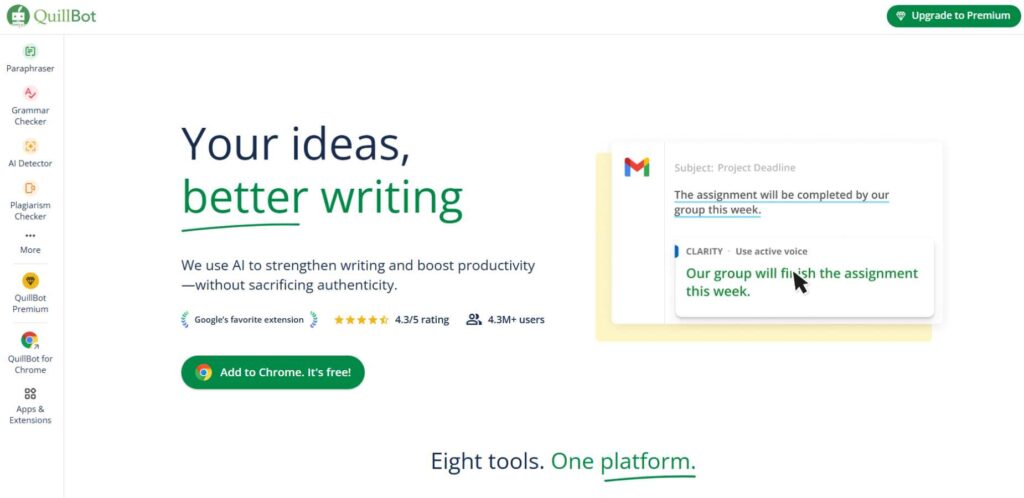
- Rating: 4.8/5
- Best For: Writing help, paraphrasing
This is one of the free ai tools for education. Developed AI writing assistant helps students and educators present their work in a more precise approach. It uses advanced natural language processing to reword content to provide the same meaning as the original; thus, it is very useful for preparing academic writing and research papers. This can help make content adaptable for specific kinds of academic purposes, though it provides multiple modes-from formal to creative.
It is one of the greatest tools for non-native English speakers who are looking forward to enhancing the quality of the writing and coming to know different ways of stating a particular statement. The grammar checker and the citation generator on the platform will make the tool practical even more for academic purposes.
Key Features:
- Paraphrasing with 7 different modes
- Grammar checker and suggestions
- Citation generator
- Plagiarism checker
- Chrome extension
- Word count optimization
Pricing:
| Plan | Pricing |
| Free | 0 |
| Premium Annual | $4.17/month |
| Premium Semi-Annual | $6.66/month |
| Premium Monthly | $9.95/month |
Website:
www.quillbot.com
2. Curipod
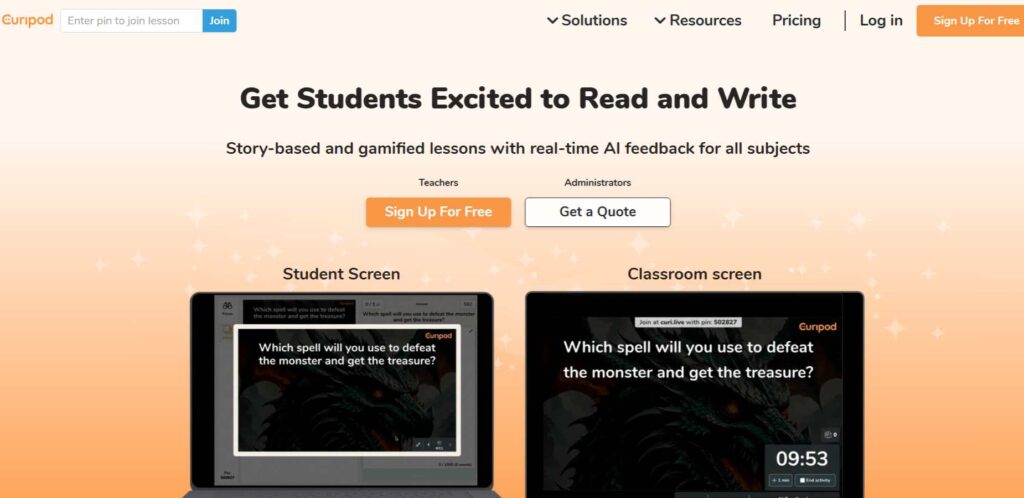
- Rating: 4.6/5
- Best For: Interactive learning and content creation
Curipod is an AI learning platform which is an innovation that creates interactive educational content for teachers as well as students. This artificial intelligence engine converts dull, routine learning materials into exciting, interactive lessons with the participation of the students themselves, thereby making every student’s learning pace and style into learning experiences.
It strongly focuses on personalized quiz generation, flashcards, and learning games based on uploaded content or curriculum requirements. Teachers can track the live progress of students and receive insights from AI about the learning patterns and areas that require improvement.
Key Features:
- AI Content creation
- Interactive lesson creation
- Live tracking of progress
- Completely customized pathway to learn
- Supports multimedia content
- Supports collaborative tools to learn
Pricing:
| Plan | Pricing |
| Free | 0 |
| Basic | $9.99 per month |
| Pro | $24.99 per month |
| Enterprise | Custom Pricing |
Website:
www.curipod.com
3. Quizlet

- Rating: 4.7/5
- Best For: Study sets and flashcards
This has evolved to become a creative AI-learning platform to wit from a traditional flashcard study system. The AI algorithms on this platform analyze millions of study patterns and create optimized paths for learning to each student. Machine learning helps pick knowledge gaps and automatically adjusts the study materials to concentrate more on areas where that particular student needs most help.
The smart grading system within the platform will understand multiple correct answers on complex subjects, especially math and science-related subjects. Quizlet AI also does better in practice questions generation and explanations catering to the students’ understanding level.
Key Features
- Artificial intelligence on study sets
- Smart grading
- Adaptive learning paths
- Voice-enabled learning
- Track progress
- Multi-language support
Pricing
| Plan | Pricing |
| Free | 0 |
| Annual | ₹190.58/month |
| Monthly | ₹499/month |
Website:
www.quizlet.com
4. Cognii
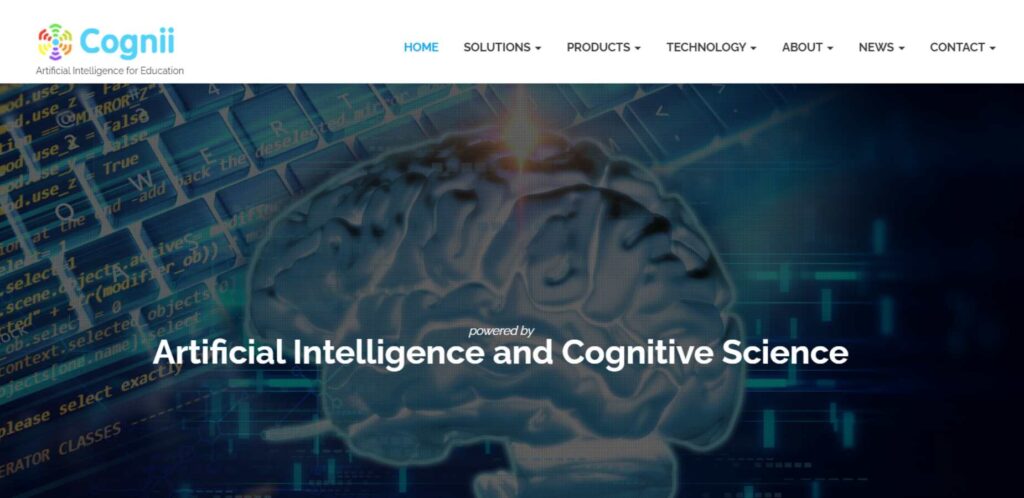
- Rating: 4.5/5
- Best For: Virtual learning assistant and assessment
Cognii represents the next generation of AI-based educational technology, with a mission to provide rich, formative feedback on open-response questions, closely simulating one-on-one tutoring by engaging learners in high-quality one-on-one tutoring conversations that help them develop critical thinking through guided discovery. Its AI system can read into complex student responses and make subtle, nuanced feedback rather than just simply right or wrong.
The platform adapts to the learning style and pace of each student, with personalized guidance and explanation. The platform can be used by teachers for the automatic assessment but still can uphold high-quality standards on feedback.
Key Features:
- Open-response assessment
- Conversational tutoring
- Automated grading
- Learning analytics
- Personalized feedback
- Integrates with LMS
Pricing:
- Price according to institution size
Website:
www.cognii.com
5. Geleza

- Rating: 4.4/5
- Best For: Personalized learning and tutoring
Geleza stands out to be an AI-innovative tutoring course that successfully focuses on single and multiple subjects based on individual learning prescriptions. Highly advanced algorithms will create a right learning path which is customized, reflecting the individual performance and personal style of every student. The approach for this firm would combine traditional teaching with some AI-driven insights for finding out areas where knowledge was lacking.
The adaptive learning techniques utilized by the system change on the fly as it takes into consideration student responses and the level of engagement to achieve optimal learning results. Geleza’s virtual tutoring sessions make use of natural language processing for live feedback and explanations.
Key Features:
- Creative and easy learning ways
- Virtual sessions of tutoring
- Timely feedback
- Progress monitoring
- Multi-subject support
Pricing:
| Plan | Pricing |
| Basic | Free |
| Standard | $14.99/month |
| Premium | $29.99/month |
Website:
www.geleza.app
6. Owlift
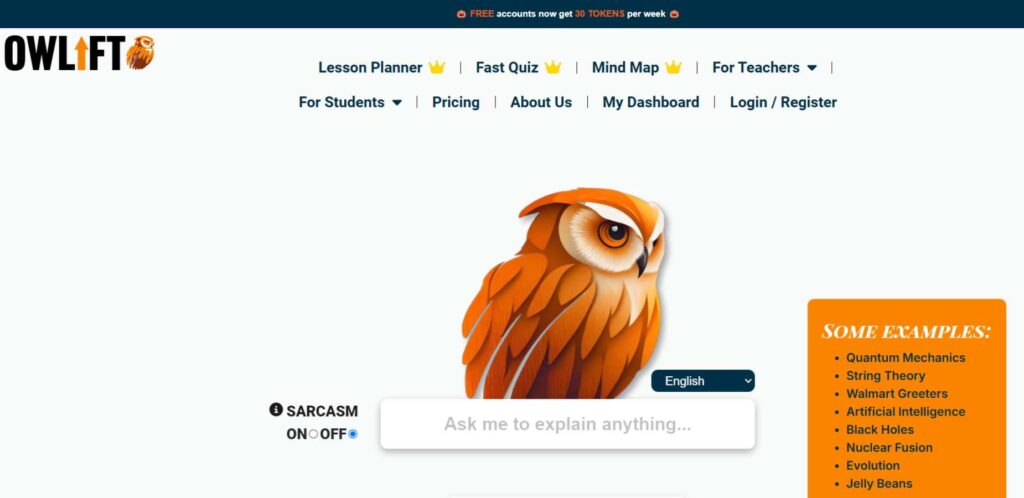
- Rating: 4.3/5
- Best For: Homework help and problem-solving
Owlift is an entirely integrated AI-based homework help application wherein students receive solutions for the most challenging academic problems in any subject under the sun. The algorithms used by this application are simply too powerful and tend to dissect complicated problems into a relatively manageable or workable step-by-step process with clear explanations and solutions.
Its unique method is focused on teaching students how to solve problems rather than providing answers, which fosters the ability of students toward critical thinking. The AI system is capable of determining the types of questions and may also consider the grade and past exposures to adapt its explanation method.
Key Features:
- Step-by-step solution
- Solving Problems in a variety of subjects
- Visual aids to learn
- Tracking Progress
- Practice Exercises
- Mobile Access
Pricing:
| Plan | Pricing |
| Monthly | $19.99 |
| Quarterly | $49.99 |
| Annual | $149.99 |
Website:
www.owlift.com
7. Summarize.tech
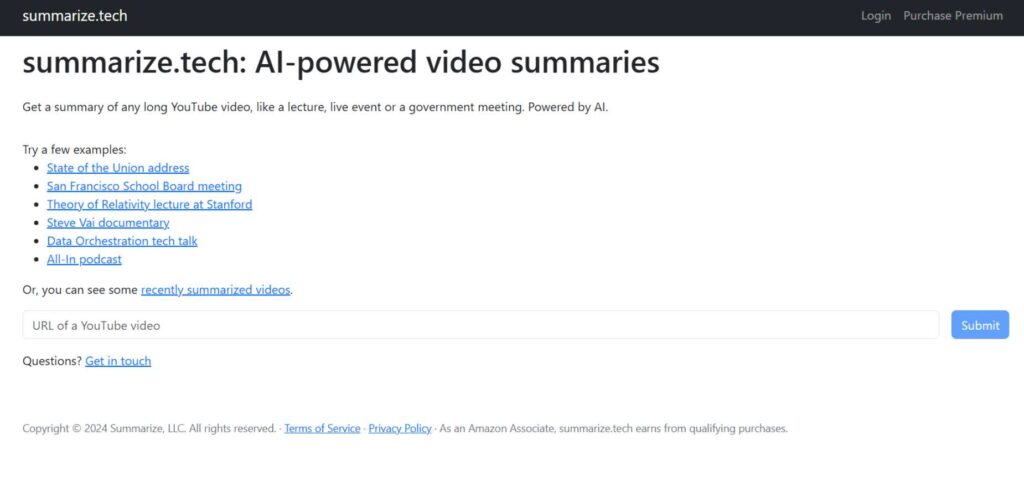
- Rating: 4.5/5
- Best for: summarization of content and study materials.
Summarize.tech is an advanced AI-based tool developed to help students and professors to reduce their weighty educational content and understand them easily. This platform excels in analyzing long academic pieces, research papers, as well as educational videos and churning out concise, easy-to-understand summaries. Its natural language processing ensures that more important points and crucial points are not lost while weeding out the redundant information.
It is possible to customize this summarizer to the academic level and subject matter of the target audience. Summarize.tech also encompasses characteristics about study notes generation, creation of chapter summaries, and extraction of core points from lectures.
Key Features:
- Multi-format content processing
- Customizable summary length
- Key point extraction
- Study note generation
- Support for several languages
- Export options
Pricing
| Plan | Pricing |
| Free | 0 |
| Pro | $12.99/month |
| Team | $29.99/month |
Website:
www.summarize.tech
8. Goodgrade.ai

- Rating: 4.6/5
- Best for: Academic performance improvement.
Goodgrade.ai is an all-around, AI-based learning improvement platform for students to better their study strategies and enhance their grades. Through machine learning algorithms, this system analyzes the study patterns of the student, as well as the test performances, and the mode of learning, and develops study plans according to that specific analysis. The platform uses predictive analytics to detect potential academic problems while they’re still in the early stages and not yet actual serious issues.
It provides detailed assignment feedback and creates customized practice material with specific areas of weakness. The adaptive learning system of Goodgrade.ai is always reading only its recommendations based on both student progress and performance data.
Key Features
- Personalized learning plans
- Performance analytics
- Customized practice materials
- Goal tracking
- Time management
- Progress reports
Pricing:
| Plan | Pricing |
| Premium | $16.99/month |
| Ultimate | $29.99/month |
Website:
www.goodgrade.ai
9. Coursebox
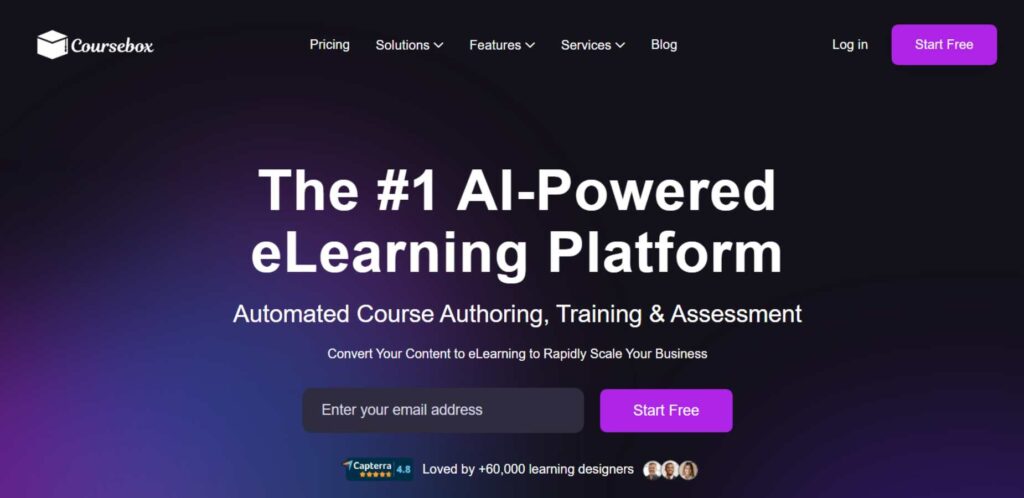
- Rating: 4.5/5
- Best For: Summarizing content and creating study materials
Summarize.tech is a sophisticated AI technology tool in terms of offering the summation assistance specifically designed for students and lecturers to reduce complex learning material into digestible chunks. The service efficiently scans extended academic texts, research papers, and educational videos converting them into brief, comprehensible summaries. Using its natural language processing capabilities it makes sure that core ideas and critical information are preserved and redundancies removed.
The summarizer can be customized towards the target audience with regard to their academic level and subject matter. Summarize.tech also supports features of creating study notes, drafting chapter summaries, as well as extracting core points from lectures.
Key Features
- Multiformat handling
- Customizable summary length
- Key point extraction
- Generation of study notes
- Support of various languages
- Export options
Pricing
| Plan | Pricing |
| Pro | $12.99/month |
| Team | $29.99/month |
Website:
www.coursebox.ai
10. Yippity

- Rating: 4.3/5
- Best For: Early education and interactive learning
Yippity comes out to be a dedicated AI-powered platform solely for early education, making learning fun and entertaining for children. The AI-based platform uses all high-tech algorithms that create age-appropriate learning experiences that adapt to the child’s developmental level and interest. Its unique approach is a conjunction of all educational content combined with those gamification elements that keep young learners’ attention while maintaining their motivation.
The system features phonics, basic mathematics, and critical thinking skills through its interactive stories and games. Yippity’s AI constantly adjusts the difficulty level and pace of learning based on the response from a child and tracks progress.
Key Features
- Age-Related Content
- Interactive Learning Games
- Track Progress
- Parent Dashboard
- Offline Access
Pricing
| Plan | Pricing |
| Monthly | $9.99 |
| Annual | $89.99 |
| Family Plan | $149.99/year |
Website:
www.yippity.io
11. ClassPoint

- Rating: 4.7/5
- Best for: Classroom engagement and management
This is a very high-end classroom management system that uses AI for enhanced pupil interaction and teaching efficiency. It integrates perfectly with the existing tools of presentation, but it also features strong AI inclusions that enhance real-time collaboration and assessment of the pupils. Such smart algorithms could then analyze students’ responses and participation patterns to give a teacher actionables on his or her classes’ engagement and understanding levels.
The system allows automatic quiz generation, live polls, interactive discussions that automatically alter according to the energy and understanding levels of the class. It also enables a teacher to easily identify the difficult students and make necessary adjustments through ClassPoint AI Data analytics.
Key Features:
- Realtime engagement tracking
- Interactive presentations
- Automated assessments
- Student analytics
- Collaborative tools
- Integration capabilities
Pricing
| Plan | Pricing |
| Basic | Free |
| Pro | $14.99/month |
| School License | Custom Pricing |
Website:
www.classpoint.io
Factors When Choosing AI Tools for Education
AI tools can really impact teaching and learning. However, one must choose the most proper tool in order to maximize its benefits. Here are the main considerations when it comes to selecting the best AI tools for education.
1. Compatibility with Curriculum
An AI tool should reflect the curriculum as well as the learning objectives. It supports the subjects, topics, and the most important skill levels in concern to the needs of the learners.
2. Ease of use
An ideal AI tool should be intuitive to use, so that it is easy to use both for the educators and the students. Complexity can deter adoption as well as usage.
3. Cost and Accessibility
Budget remains a common headache for educational institutions. Look out for tools that have free versions, good prices, or ‘school discounts.’ In addition, the tool must be available on all devices and across platforms.
4. Personalization Features
Another giant advantage of the AI tools is giving personalized learning experiences. Choose tools that adapt content to individual learning paces and styles.
5. Security and Privacy Compliance
AI tools handle sensitive information, like students and their academic records. Ensure that the tool has the same protection of data practices as seen under GDPR or FERPA.
Conclusion
AI tools for education are reshaping the traditional teaching and learning method with personalization, efficiency, and new methodologies of academic performance improvement. However, compatibility, cost, and privacy compliance need to be kept in mind while finalizing the appropriate AI tool for the task. More prominent issues related to data security, accessibility, and possible biases also need to be addressed for effective utilization.
FAQs
What are AI tools for education?
AI education tools represent a type of software or platform that utilizes artificial intelligence technologies to maximize teaching and learning.
Are AI tools expensive?
AI tools vary from free open-source platforms to premium software.
Can AI tools replace teachers?
No, AI tools are designed to support teachers by removing drudge loads and adding personalization to the learning process.
Are AI tools safe to use?
Yes, generally, but only in the right way: when they have been set up to abide by the rules of data protection law.

